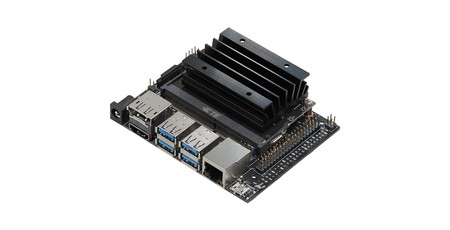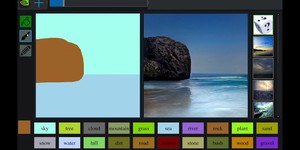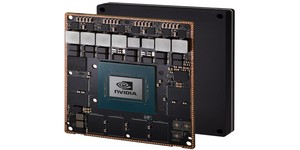
Nvidia has announced it is having another crack at the maker market, launching a low-cost variant of its Jetson artificial intelligence (AI) hardware platform designed to take on the like of Google's Coral and Intel's Neural Compute Stick.
Nvidia first indicated it might like to capture a slice of the market currently dominated by the Raspberry Pi with the 2014 unveiling of the Jetson TK1 single-board computer (SBC). Based on the company's Tegra K1 system-on-chip (SoC), the board included 192 Kepler-based graphics processing cores alongside a five-core Arm processor, 2GB of RAM, and a 16GB eMMC flash storage module. Launched in the US at $192 - a dollar per GPU core, Nvidia founder and chief executive Jensen Huang crowed during the unveiling - the part proved relatively unpopular despite its improved performance over cheaper alternatives, and when it came time to replace it the Jetson TX1 dropped the maker market for professionals with a $299-per-unit tray price.
Since then, the Jetson family has only been moving further away from its origin as a low-cost, readily-accessible platform for makers, tinkerers, educators, and industry. The $299 TX1 was followed by the $599 TX2, and the AGX Xavier computer-on-module (COM) which sits at the very top of the Jetson range hit a whopping $1,399 as a bare module - though the developer kit variant recently received a discount down to $1,299 in limited quantities.
Now Nvidia is looking to get back to Jetson's roots, announcing a pair of low-cost designs with which it hopes to recapture interest from the maker market: the Jetson Nano Module and Jetson Nano Developer Kit.
'We realised that we have an opportunity to bring AI to a whole new community,' explains Nvidia's Jesse Clayton. 'The maker movement, which was made possible in part by low-cost computers like the Raspberry Pi, has really led to a rapid growth in the embedded developer community, and it has brought higher technological competency to tens of millions of people. The Jetson Nano Developer Kit is a $99 AI computer for makers, learners, developers, and inventors.'
Based around a quad-core 1.43GHz Arm Cortex-A57 CPU and 128 Maxwell GPU cores with 4GB of shared LPDDR4 memory, the Jetson Nano Module - a mildly modified variant of which, missing the onboard 16GB eMMC storage, sits at the heart of the Jetson Nano Developer Kit - is claimed to offer 472 gigaflops of FP16 compute performance. Coupled with the onboard connectivity and graphics processing chops, that translates to the ability to run multiple deep-learning algorithms on multiple incoming video streams simultaneously: 'Jetson Nano is processing eight 1080p streams in parallel,' Clayton explains of a video demonstration of the board's capabilities, 'running an object detection network on all eight simultaneously.'
Nvidia has two main selling points for the Jetson Nano family above and beyond their low cost: performance and compatibility. According to Nvidia's own internal performance tests the Jetson Nano outperforms the combination of a Raspberry Pi 3 and Intel Neural Compute Stick 2 - the latter of which has its performance limited by the Pi's USB 2.0 ports - at the Resnet50, VGG-19, Mobilenet v2, SSD Mobilenet-V2 (300 x 300), Super Resolution, Unet, and OpenPose workloads by a considerable margin, while offering compatibility with other workloads including Inception v4, high-resolution SSD Mobilenet-v2 at 960 x 544 and 1,920 x 1,080 - the latter at only three frames per second, which Clayton points out is good enough for something like quality inspection on a production line - which are not compatible with the Pi/NCS combo.
The Jetson Nano does, however, lose the performance crown in a head-to-head race with Google's recently-launched Coral Edge TPU Development Board: While the two are neck-and-neck in the Inception v4 workload, Mobilenet-v2 and SSD Mobilenet-v2 (300 x 300) see the Coral beating the Jetson Nano by between three- and sevenfold - but offering considerably less compatibility with broad software offerings than even Intel's Neural Compute Stick 2. 'Edge TPU is fast for some small classification networks,' Clayton explains, 'and it's probably going to be really useful for some AI devices. But the architecture isn't really suited to run large deep neural networks, nor is it suited to high input resolutions.'
Nvidia has confirmed that the Jetson Nano will be available worldwide, with the $129 module variant - which uses a SODIMM form factor - to be produced and supported for the next five years, and the cheaper $99 developer kit for at least two. UK pricing has been set at £95 plus £6.50 shipping (both inc. VAT) direct from Nvidia for the developer kit variant, with no pricing yet available for the module. The company has also confirmed that there will be no maximum nor minimum order quantities for the Jetson Nano Developer Kit.

MSI MPG Velox 100R Chassis Review
October 14 2021 | 15:04








Want to comment? Please log in.